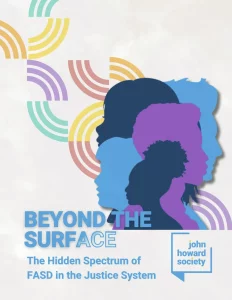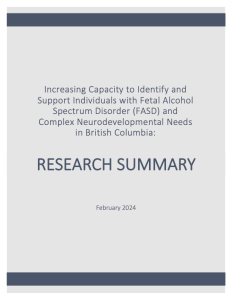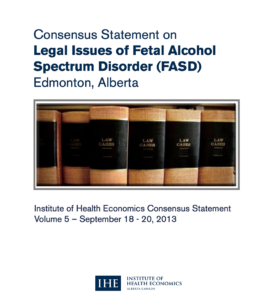People with FASD are disproportionately represented in the criminal justice system, both in the youth and adult systems. This is often a result of a lack of FASD knowledge and FASD-informed services, as well as a lack of appropriate early identification, intervention, and support for those with FASD. Research in this area can to prevent criminal justice involvement, identify those with FASD in the system, and determine appropriate community-based interventions and supports for this population.
Reports and Resources
Beyond the Surface: The Hidden Spectrum of FASD in the Justice System
There is a critical need for community-based programs that address the unique needs of justice-involved youth with FASD and equip them with resources that will help prevent justice system involvement. This report provides an overview of the All 4 One FASD Youth Justice Program, an innovative program that provides wrap-around supports and resources to youth with FASD, their caregivers, and the broader community.
Research Summary: Increasing capacity to identify individuals with FASD in BC (2024)
The information summarized in this report is an overview of the data and knowledge gathered through various research methods to understand the full spectrum of supports and services available for those with FASD involved in the criminal justice system in British Columbia.
Children’s Rights in the Child Justice System
FASD & General Comment 24 (2021)
Children are human beings with their own rights. The purpose of this policy alert is to bring attention to the rights of the child – particularly youth with FASD – in relation to Canada’s justice system.
Consensus Statement on Legal Issues of Fetal Alcohol Spectrum Disorder (FASD) (2013)
This consensus statement explores the implications for the justice system when the needs of FASD-affected individuals go unmanaged in the broader community and ultimately surface in the legal context.
Key Journal Articles
These key journal articles, authored by members of the CanFASD Research Network and partners, describe various factors related to FASD and the justice system:
An updated systematic review of the literature on fetal alcohol spectrum disorder and the criminal legal system
Katherine Flannigan, Jessica W. Pun, Pamela Buttinger, Kaitlyn McLachlan, Kathleen Holmstrom, Melissa Tremblay, Mansfield Mela & Jacqueline Pei
International Journal of Law and Psychiatry, February 2025
Fetal alcohol spectrum disorder evidence in Canadian criminal cases: A case law review.
Mullally, K., McLachlan, K., Jewell, E., Viljoen, J., & Rudin, J.
Psychology, Public Policy, and Law, 2023
Risk, rights and deservedness: Navigating the tensions of Gladue, Fetal Alcohol Spectrum Disorder and settler colonialism in Canadian courts
Dickson, J. & Stewart, M.
Behavioral Sciences & The Law, September 2021
Fetal Alcohol Spectrum Disorder and the criminal justice system: A systematic literature review
Flannigan, K., Pei, J., Stewart, M. & Johnson, A.
International Journal of Law and Psychiatry, 2018
Fetal alcohol spectrum disorder and youth justice: a prevalence study among young people sentenced to detention in Western Australia
Bower C, Watkins RE, Mutch RC, et al.
BJM Open, 2018
Fetal Alcohol Spectrum Disorders in the Criminal Justice System: A Review
Brown J, Long-McGie J et al.
Journal of Law Enforcement
The lived experience of paroled offenders with fetal alcohol spectrum disorder and comorbid psychiatric disorder
Tait, C. L., Mela, M., Boothman, G. & Stoops, M. A.
Transcultural Psychiatry, February 2017
Issue Papers
Papers summarizing key issues related to FASD and the criminal justice system include:
Gap Analysis: Human Trafficking and Fetal Alcohol Spectrum Disorder (2023)
This paper describes we know about human trafficking and FASD, identifies complexities unique to FASD that can increase vulnerability to trafficking, and gives recommendations for research, policy, and practice.
FASD and the Criminal Justice System: A Review (2018)
Involvement in the criminal justice system has long been identified as a significant adverse outcome for many individuals with FASD. The goal of this issue paper is to give a summary of the current state of the evidence on FASD in the criminal justice system.
Victimization in People with FASD (2018)
In the context of criminal justice, most researchers mention the increased risk of people with FASD coming into contact with the system as offenders, witnesses, and/or victims. However, very little attention is paid to the complexities of the victimization of those with FASD. This issue paper explores victimization in FASD and make recommendations for improving the justice process for these individuals.



